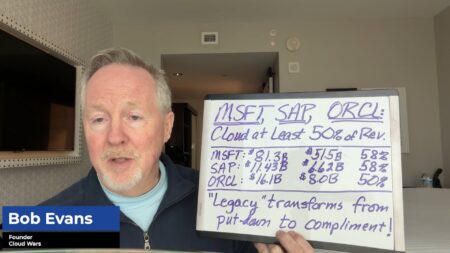You can’t open a news source these days without hearing two conflicting stories.
On the one hand, multiple firms are starting to lay off people to right-size their staff due to economic, societal, and financial pressures. On the other, you see firms like American Express announcing a large hiring initiative for developers and other tech talents. The reality? Contradictory talent plans are happening all over the world in our industry — because tech talent is still in a massive, short-supply situation. In fact, if you look at all the layoff news, what you see is leadership, management, and non-tech roles being eliminated; few firms are eliminating tech talent because, currently, they just don’t have enough of it.
Right now, the tech job unemployment rate is just 2 percent, and there were nearly 4 million jobs posted for tech positions over the past 12 months, according to CompTIA’s “Workforce and Learning Trends” report. This is likely to continue for the foreseeable future, as the tech job growth rate is projected to rise twice as fast as overall U.S. employment through 2032. In fact, three in four human resources professionals surveyed expect it will take longer than it already does to fill open job positions over the next 12 months, according to CompTIA.
The tech talent shortage isn’t over, and it shows no signs of abating as we are severely short of talent on multiple vectors across multiple technologies, particularly in the U.S. As such, competition for tech talent remains fierce.
So, how do we win in the tech talent war?
Culture Is the New Driver
Firms like American Express are using something beyond the work to attract talent. They are focusing on flexibility of location, office attendance, and hours to appeal to more diverse, skilled talent who, when grappling with a “return to work,” have a different definition of their return.
In talking about American Express’ plan to hire 1,500 technology colleagues in the U.S., India, and Europe, Chief Information Officer Ravi Radhakrishnan, said this about the culture: “There’s a lot of talent that wants to understand how we approach flexibility. It’s not just the flexibility that we offer — the option to be virtual, in-person, or hybrid. It’s combining it with purpose. We do that. We ask people to work with their leaders to determine the purpose for coming in.”
We could say that culture eats information technology (IT) staff shortages for breakfast and has room to hire more people by lunchtime. Culture is the new driver for talent-rich tech firms, and those firms forgetting about this part of the talent equation will face even more severe shortages, especially as increasing numbers of firms evolve their talent plans to include fewer business generalists and more technology-minded staff members.
The Evolving Nature of Work
Has the nature of work changed that much already? Yes, it has changed that much.
In the past, there were technology companies, car companies, healthcare companies, and myriad other company types. Today, most companies are becoming technology companies. Those car companies are now putting computers on wheels on the road with thousands of chips and hundreds of software programs, all of which require tech talent — and a lot of it. Those healthcare companies are now starting to use robotics, the Internet of Things (IoT), and artificial intelligence (AI), as well as augmented reality and virtual reality (AR/VR) to aid in patient care, surgeries, and outcome-based treatments. They’re now tech companies that treat patients.
This change in the very definition of what work matters — technology work for most firms — has exploded over the past few years. Further, there is no slowdown in sight. As firms redefines their products and customer experience to be digital-first and technology-first, it changes not only how they portray themselves in the industry, but also what kind of talent matters to the business. This creates even more competition for tech talent in an already tight market.
Smart firms are leaning into this trend and finding unique new ways to attract and retain talent. For example, some firms are seeking out less traditional candidates and training them on simple DevOps or other roles, as well as collaborating with their local schools, gaming clubs (gamers make for some great tech talent pools), and other less obvious places where skills are transferable or at least trainable.
These firms are even offering free education in exchange for a time commitment — and with our current student debt crisis that sounds very appealing to many young talented technology-minded students. But the talent wars continue as firms across the globe battle to get the talent they need at a cost that won’t break the bank.
Standing Out in the Tech Talent War
Can you stand out if you aren’t Google, Amazon, Apple, Tesla, or so on? Yes, you can, but it takes some work.
The reality is technology’s next generation is focused on building more than a job track — it’s building a life track. That means work must fit into life plans and aspirations as well as provide a purpose that matters. Long gone are the days of a slightly higher salary and some benefits being enough to attract talent away from the competition. Although to be fair, salaries are up for those who switch jobs, so firms do need to ensure they are competitive on salary — but it’s not the be-all-end-all that it used to be.
Firms that are attracting the best tech talent have a secret that goes far beyond money and enters the world of meaning and purpose. People want to work somewhere that has a truly defined purpose — and, for the record, that purpose does not have to be far-flung and wide-reaching; it just needs to be meaningful.
Firms that define why their products or services matter to their customers, the community, and their teams will quite simply win more talent than firms that are unclear on these stories. Take time and craft your purpose and your reason for being, then use that in all your tech talent marketing.
The bottom line in the talent tech war is that the best way to win is by putting the talent first. Think about their needs for flexibility, education, culture, and purpose. Only by focusing outward can you hope to attract the talent you need to succeed.
Happy talent hunting!
Want more tech insights for the top execs? Visit the Leadership channel:







